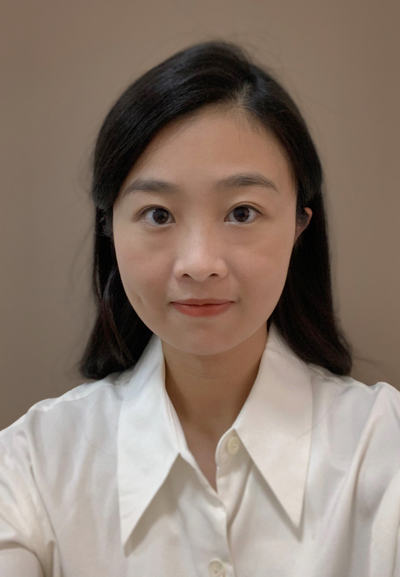Dr. Amber Xiaoping WU 吳曉萍
Biography
Dr. Xiaoping Wu obtained her Bachelor and PhD in Pharmacology at the China Pharmaceutical University and the University of Hong Kong (HKU), respectively. She received her post-doctoral training in the Department of Pharmacology and Pharmacy at HKU. She is currently a research assistant professor in the department. Her research focuses on obesity-related metabolic diseases and the role of adipokines under both physiological and pathological conditions.
Memberships & Editorships
Memberships:- Ordinary Member of Hong Kong Society of Endocrinology, Metabolism, and Reproduction
- Member of the State Key Laboratory of Pharmaceutical Biotechnology, The University of Hong Kong
Editorships:
- Member of Young Editor Board of Chinese Medicine
Honours and Awards
- Young Investigator Award: 15th International Symposium on Healthy Aging “Towards Enduring Youth” (Hong Kong, 2021)
Research Interests
- Identification of therapeutic targets for metabolic diseases including type 2 diabetes, type 1 diabetes, and liver diseases.
- Lipid metabolism in adipose tissue and the liver.
- Evaluation of therapeutic effects of natural products in cancer-related diseases.
Publications
Selected Publications
- WU, X., Cheong L.Y., Yuan, L., Jin, L., Zhang, Z., Xiao, Y., Zhou, Z., Xu, A., Hoo, R.L., Shu, L. (2024) Islet-Resident Memory T Cells Orchestrate the Immunopathogenesis of Type 1 Diabetes through the FABP4-CXCL10 axis. Advanced Science. (IF: 15.1)
- Wu, X., Shu, L., Zhang, Z., Li, J., Zong, J., Cheong, L.Y., Ye, D., Lam, K.S., Song, E., Wang, C. Xu, A., and Hoo, R. L. (2021). Adipocyte fatty acid binding protein promotes the onset and progression of liver fibrosis via mediating the crosstalk between liver sinusoidal endothelial cells and hepatic stellate cells. Advanced Science, 8(11), 2003721. (IF: 17.52)
- Cheng, Y.*, Wu, X*., Nie, X., Wu, Y., Zhang, C., Lee, S. M. Y., ... & Li, J. (2022). Natural compound glycyrrhetinic acid protects against doxorubicin-induced cardiotoxicity by activating the Nrf2/HO-1 signaling pathway. Phytomedicine, 106, 154407. (IF: 6.66)
- Li, H. L.*, Wu, X*., Xu, A., and Hoo, R. L. C. (2021). A-FABP in metabolic diseases and the therapeutic implications: an update. International journal of molecular sciences, 22(17), 9386. (IF: 5.92)
- Liu, Z.*, Wu, X*., Dai, K., Li, R., Zhang, J., Sheng, D., Lee, S.M.Y., Leung, G.P.H., Zhou, G.C. and Li, J. (2022). The new andrographolide derivative AGS-30 induces apoptosis in human colon cancer cells by activating a ROS-dependent JNK signaling pathway. Phytomedicine, 153824. (IF: 6.66)
- Cheong, L.Y., Wang, B., Wang, Q., Jin, L., Kwok, K.H., Wu, X., Shu, L., Lin, H., Chung, S.K., Cheng, K.K. and Hoo, R.L., 2023. Fibroblastic reticular cells in lymph nodes potentiate white adipose tissue being through neuro-immune crosstalk in male mice. Nature Communications, 14(1), p.1213. (IF: 17.694)
- Yang, K., Velagapudi, S., Akhmedov, A., Kraler, S., Lapikova-Bryhinska, T., Schmiady, M. O., Wu, X., ... & Lüscher, T. F. (2023). Chronic SIRT1 supplementation in diabetic mice improves endothelial function by suppressing oxidative stress. Cardiovascular Research, 119(12), 2190-2201. (IF: 14.239)
- Nie, X., Fu, L., Cheng, Y., Wu, X., Lv, K., Li, R., ... & Li, J. (2023). Garcinone E suppresses breast cancer growth and metastasis by modulating tumor‐associated macrophages polarization via STAT6 signaling. Phytotherapy Research. (IF: 6.39)
- Qiu, H., Song, E., Hu, Y., Li, T., Ku, K. C., Ye, D., Wang, C., Cheung, B. M. Y., Cheong, L. Y., Wang, Q., Wu, X., Hoo, R. L. C., Wang, Y., and Xu, A. (2022) Hepatocyte-secreted Autotaxin Exacerbates Nonalcoholic Fatty Liver Disease Through Autocrine Inhibition of the PPARalpha/FGF21 axis. Cellular and Molecular Gastroenterology and Hepatology. (IF 9.23)
- Li, J., Li, R., Wu, X., Zheng, c., Shiu, P. H. T., Rangsinth, R., Lee, S. M. Y., and Leung, G. P. H. (2022) An Update on the Potential Application of Herbal Medicine in Promoting Angiogenesis. Frontiers in Pharmacology (IF: 5.81)
- Xiao, Y., Shu, L., Wu, X., Liu, Y., Cheong, L.Y., Liao, B., Xiao, X., Hoo, R.L., Zhou, Z., and Xu, A. (2021). Fatty acid binding protein 4 promotes autoimmune diabetes by recruitment and activation of pancreatic islet macrophages. JCI insight, 6(7). (IF: 9.48)
- Li, J., Li, R., Wu, X., Hoo, R.L.C., Lee, S.M.Y., Cheung, T.M.Y., Ho, B.S.Y., and Leung, G.P.H. (2021). Amauroderma rugosum Protects PC12 Cells against 6-OHDA-Induced Neurotoxicity through Antioxidant and Antiapoptotic Effects. Oxidative Medicine and Cellular Longevity, 2021. (IF: 7.31)
- Shu, L., Liu, Y., Li, J., Wu, X., Li, Y., and Huang, H. (2021). Landscape profiling analysis of dpp4 in malignancies: therapeutic implication for tumor patients with coronavirus disease 2019. Frontiers in oncology, 11, 152. (IF: 6.24)
- Shi, J., Li, J., Li, J., Li, R., Wu, X., Gao, F., Zou, L., Mak, W.W.S., Fu, C., Zhang, J., and Leung, G.P.H. (2021). Synergistic breast cancer suppression efficacy of doxorubicin by combination with glycyrrhetinic acid as an angiogenesis inhibitor. Phytomedicine, 81, 153408. (IF: 6.66)
- Shu, L., Zhong, L., Xiao, Y., Wu, X., Liu, Y., Jiang, X., Tang, T., Hoo, R., Zhou, Z., and Xu, A. (2020). Neutrophil elastase triggers the development of autoimmune diabetes by exacerbating innate immune responses in pancreatic islets of non-obese diabetic mice. Clinical Science, 134(13), 1679-1696. (IF: 5.22)
- Shu, L., Hoo, R.L., Wu, X., Pan, Y., Lee, I.P., Cheong, L.Y., Bornstein, S.R., Rong, X., Guo, J., and Xu, A. (2017). A-FABP mediates adaptive thermogenesis by promoting intracellular activation of thyroid hormones in brown adipocytes. Nature communications, 8(1), 1-16. (IF: 14.92)
- Hoo, R.L., Shu, L., Cheng, K.K., Wu, X., Liao, B., Wu, D., Zhou, Z., and Xu, A. (2017). Adipocyte fatty acid binding protein potentiates toxic lipids-induced endoplasmic reticulum stress in macrophages via inhibition of Janus Kinase 2-dependent autophagy. Scientific reports, 7(1), 1-15. (IF: 5.13)
- Zhao, Y., Yao, J., Wu, X.P., Zhao, L., Zhou, Y.X., Zhang, Y., You, Q.D., Guo, Q.L., and Lu, N. (2015). Wogonin suppresses human alveolar adenocarcinoma cell A549 migration in inflammatory microenvironment by modulating the IL‐6/STAT3 signaling pathway. Molecular carcinogenesis, 54(S1), E81-E93. (IF: 4.78)





